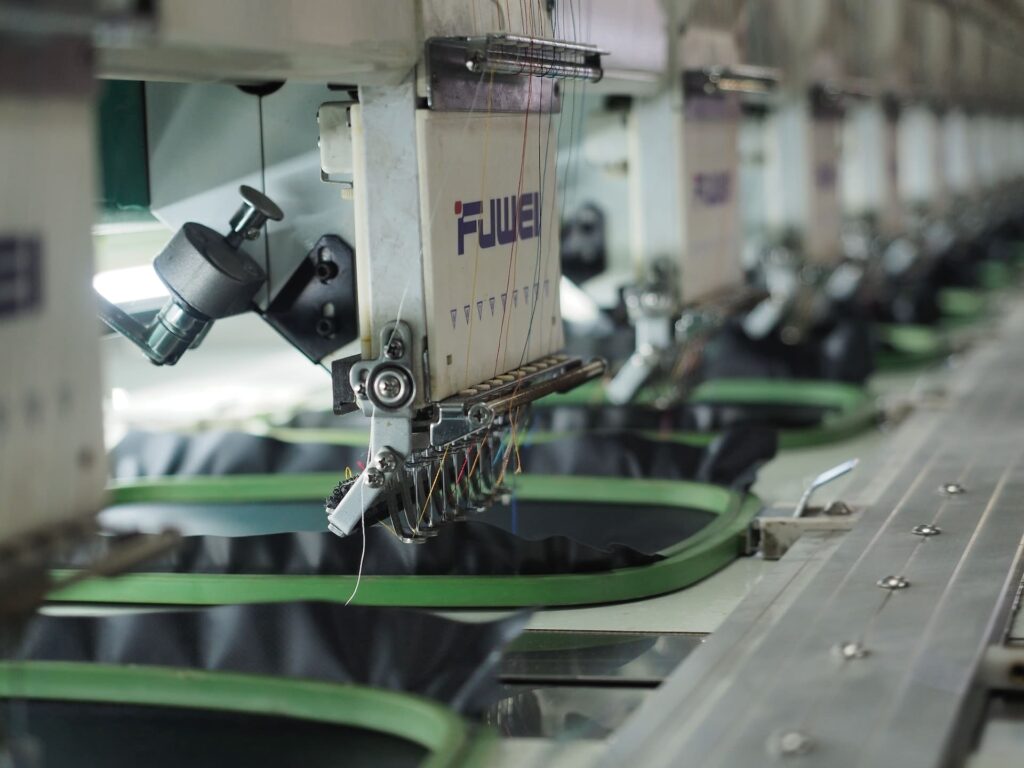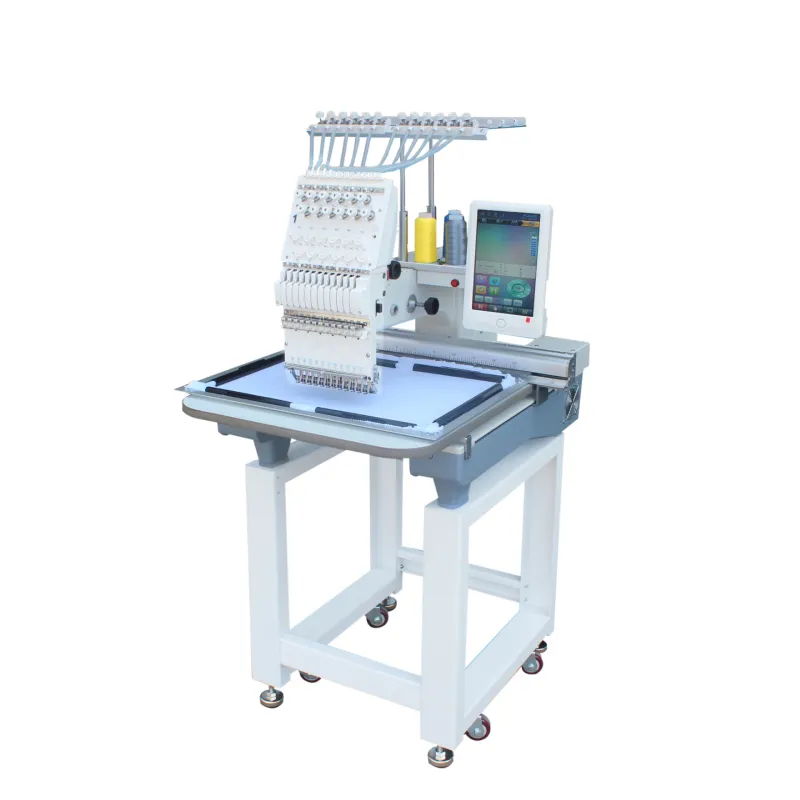When it comes to picking out anembroiderymachine for your shop, you’re pretty much spoiled for choice. There are plenty of reputable machine manufacturers to choose from, like Brother, Bernina, and Tajima. But with many factors to consider in a machine, which one is right for you and your business needs?
Types of Embroidery Machines
Most machines are divided into three main categories: single-needle, multi-needle, and industrial machines. Each type has its purposes as well as its share of advantages and disadvantages.
Single-Needle Machines

Single-needle machines are usually found as combination machines that allow for sewing and embroidery. This is because many users tend to have experience in sewing or crafts and want to also get into embroidery. They’re usually affordable, have a small footprint, and are relatively easy to use – perfect for beginners. You can find these machines sold in retail and craft stores, as well as from licensed embroidery machine resellers.
The most common single-needle machine is the flatbed. Flatbeds are primarily used for hobby embroiderers or those who want to learn how to embroider. It might be fine to use these for making embroidery to sell on a very small scale. They may also incorporate some pre-digitized designs that you can use for your embroidery, removing the need to digitize designs independently. However, knowing how to digitize designs can be a plus point in the long run.
SIngle-needle machines are best used for simple designs and monograms. While limited, they’re still good platforms for learning the ropes of embroidery or selling custom embroidery in small quantities for individual customers. Anything more than that would be beyond the machine’s capabilities.
Truth be told, single-needle machines are not built to create and sell embroidered goods. There are a lot of limitations that a flatbed machine faces. For one, depending on the size of the design, flatbeds don’t have the appropriate amount of space to create these designs. Moreover, because the embroidery runs on a flat surface, you won’t be able to embroider properly on various surfaces, like caps.
Flatbeds also only run one color thread at a time, making it unnecessarily difficult to embroider multi-colored designs. You’ll constantly have to stop the machine so you can switch threads, which only serves to delay your embroidery work.
Multi-needle Machines

As the name suggests, these embroidery machines can have between four and sixteen needles. Unlike single-needle machines, multi-needle machines are built specifically for people who wish to sell embroidery on a small-to-medium scale: nowhere as small as a hobbyist working in their free time, but nowhere as large as a commercial embroiderer.
As such, these machines are built with more functions than single-needle machines. Multi-needle machines can support multiple threads of varying colors, embroider on various surfaces, and do their job at much faster speeds. These machines also have a bigger footprint than single-needle machines and, thus, have a larger area for embroidery. This ensures you can create designs of various shapes and sizes.
Crucially important is that you won’t need to babysit your multi-needle machines while they’re running. Once you’ve provided the machine with the embroidery instructions, it’ll be able to create the design without needing your constant supervision. You only need to check the final product and ensure it’s up to quality standards.
At the same time, these machines are larger and more expensive to purchase. Even low-end machines can go for at least $6,000. However, that includes other aspects besides the machine’s functionality; some machines may be sold in starter or professional sets that come bundled with various accessories such as extra hoops, bundled threads, and more. You may also be entitled to receive training to use the machine from the vendor and access (limited) live support if you have issues troubleshooting your machine.
Note that affordable models may be missing some key features that may be handy for your embroidery, while more expensive ones will have them. Still, the cost factor alone will hinder you from acquiring one for your business – thankfully, financing is available for many machines. Moreover, while you can start with a multi-needle machine, it’ll be a significant learning curve to figure out everything to get it running to your liking. You can get a good deal of support from the vendor/reseller to help you out with this hurdle.
Industrial Machines

Commonly referred to as multi-head machines, sometimes confused with multi-needle machines, these commercial machines are larger than regular multi-needle machines. They usually have multiple heads (hence their name) to embroider multiple items at once, along with a larger embroidery area and faster stitching speeds. They are ideal for commercial embroidery businesses to fulfill high-volume mass production orders quickly.
Multi-head machines come in all shapes and sizes. For example, twin-head models are available for those who want to maximize productivity without spending a huge sum on a larger model. Also, dual-function machines allow you to simultaneously embroider the same design on two different materials (such as a shirt and a cap).
Purchasing a multi-head machine hinges on various factors in how you run your embroidery. Do you embroider multiple items with the same design at once? Do you have bulk orders regularly? Can you afford a multi-head machine, as they can be pretty expensive? Do you even have the space to fit one in your shop?
Most shop owners usually prefer multiple multi-needle machines for their flexibility and lower cost of entry without sacrificing quality. You can still get the same results from two multi-needle machines as you would from a single multi-head machine, and you won’t even have to break the bank, either.
Wholesale Commercial Industrial Automatic 15 Needles Single Head Computer Hat Tshirt Cap Computer Embroidery Machine
What You Should Look For
How do you know if any of these machines will work in your favor? The answer lies in narrowing down your expectations from your embroidery business: who are you catering to? What kind of items will they need to be embroidered? What features in a machine are more important?
Carefully consider the following factors to be better informed about the right machine for your shop. It also helps if you do your own research as well; these are only suggestions to help nudge you towards the right decision suited for your shop. Every shop owner runs things differently, so keep your business needs in mind and tailor these factors accordingly.
Cost

How much of a budget do you have for purchasing embroidery machines? Home embroiderers and embroidery shops will need to weigh their options carefully since they don’t have a lot of money to spend; in the latter’s case, they need to be realistic with their purchases and ensure that an ROI is possible.
While it may be tempting to purchase cost-effective alternatives, remember that you’ll get what you paid for. Most budget embroidery machines may only have the bare necessities in terms of functionality, which might end up limiting what you can do with them. Some machines might present a variety of mechanical issues down the line. Suppose there aren’t any official support channels for troubleshooting these problems. In that case, you’ll waste a lot of valuable time, money, and effort trying to fix it – and you won’t be making anything in the process.
Generally, single-needle machines are the more affordable option, but that “affordability” can go anywhere between $3,000 to $7,000 or more. Multi-needle machines are in a higher price bracket, sometimes going from $10,000 to upwards of $20,000 or more. As for commercial multi-head machines, the price can be much higher than $50,000, reflecting their immense size and capabilities.

On the other hand, expensive machines may offer plenty of bells and whistles, but which ones are more useful? Will there be features you’re not going to use at all? If you invest in such a costly machine but are barely making full use of its capabilities, was it really a worthwhile investment?
Spatial Requirements
You’d also need to be mindful of the amount of space you have at home or in your shop. Single-needle machines have the smallest footprint and are ideal for home embroidery since they can fit almost anywhere. Some compact multi-needle machines also exist that make it viable for even home embroiderers to have at home.

Embroidery shops usually have a dedicated space where the embroidery machines can work uninterrupted, but it still depends on the overall area the shop occupies. Smaller shops will undoubtedly need to make good use of every bit of space they have available, so they’ll need to look at compact multi-needle machines. The more machines you can support, the better your overall productivity. Just make sure there’ll be enough space for your staff to move around and check the quality of each machine you have.
Some machines also have wheels mounted to enable you to move them around your shop, whether moving them so you can clean the embroidery room or for other reasons. The bigger industrial machines don’t have this because of their larger size and footprint, so you should also consider it.
Embroidery Area

You’ll need to ensure a machine has sufficient space for working on different substrates. The bigger the area, the larger materials the machine can work with. Single-needle machines are a good choice for home or hobby embroiderers who don’t create complicated, multi-colored pieces, as they usually have an embroidery area of up to 8” x 8”.
In contrast, multi-needle machines have larger throat widths and are best for shops that cater to various embroidery designs on bigger materials. You can find machines with areas as much as 16” x 10” or higher. Bigger machines naturally have bigger areas to work with, so it would be ideal if you make embroidery on curtains, quilts, and blankets.
Machine Functionality
While most machines share similar capabilities, each manufacturer will find ways to diversify their machines and set them apart from competitors. Some machines may feature quality-of-life additions to make hoop garments or fabrics easier or ease/automate the threading process. Some might make it easy to maintain or allow you to interface directly with your digitizing software. Be sure to review the product description to know what the machine can do for you.
Note also the machine speeds that the machine can use. Not all embroidery designs will work at high speeds, so having the option to toggle between different speeds would be very helpful. Machines with external LCD displays are also beneficial, as you can quickly adjust various settings on the machine with a few button presses. These are just a few examples of functions that can add value to your machine and make it much easier to get embroidering.
Bundled Software
Some machines may be sold in attractive packages that include various goodies, including software. Included software may be digitizing software so you can digitize designs of your own or those from your customers or digital design software for creating designs from scratch. In some cases, you might get a combination of both.
Oftentimes, this bundled software only works with that particular manufacturer’s embroidery machines. It could be problematic if you have machines from other brands in your shop, so try to stick with one brand for the sake of convenience.



